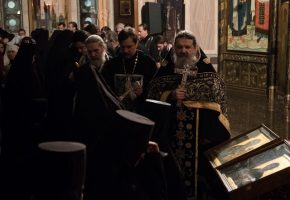“When you make the sign of the cross, you remember that God is the boss.”
This is a simple rhyme and at the same time, a profound truth. It is a reminder that we are not in control, God is. What is it about music and rhyme that attracts us so?
Music is a universal language central to every culture of the world. It has been used to entertain, communicate, educate and inspire. Rhyme, rhythm, song and movement have historically been used as powerful teaching tools that have infused the values, morals and customs of cultures and societies.
Speaking from experience, the best way to get a sleepy or disengaged student to wake up and get excited about learning is to have them move their bodies and sing along in song. Research has proven that music reduces mental fatigue, calms tensions, focuses thinking and greatly impacts creativity.
Here are some more convincing reasons why we should use music to teach our children both at home, at church and at school:
1. The human body is more than 70 percent water, and water is a perfect conductor of vibration. This is precisely why music has an energizing effect on the body.
2. Learning through music is extremely effective because it is completely brain compatible. Music is auditory, kinesthetic/tactile (movement), and elicits emotion. When song lyrics are made available in the printed form, music also taps the visual modality.
3. Music gets stored in our long- term memory (ALPHA and THETA brain wave states which are more conducive to memory and creativity), which is why we remember songs.
4. Music simply makes learning easy and more fun.
There is so much deep theology and catechism in our Church hymnology; simply study the hymns of St. Ephrem the Syrian as an example and be inspired to pray as well as learn about our faith: The boldness of our love is pleasing to you, O Lord, just as it pleased you that we should steal from your bounty. – Hymns on Faith 16:5.
In this regard, we as Orthodox are richly blessed. As for original Orthodox Christian music that children can listen to and sing in a “fun” way through Vacation Bible School (VBS) church school or at home, we are lacking.
Our Protestant friends have a wealth of music for children – much of it is good and Bible-based as I discovered from teaching an “Orthodoxized” version of a Christian VBS for many years. However, there were some years I recall teaching the music when the songs were, let’s just say, lacking substance. Why aren’t there non-liturgical songs to teach our Orthodox children about the feasts of the Church, about the saints, about icons and making the sign of the cross? My passion is teaching with music, and I felt that God was calling me to do something about it.
Hence, “God is the Boss” was written, along with now over 50 songs for Orthodox children of all ages.
The truth is, parents want their children to learn about God and about their faith, but many have a lack of knowledge themselves. That is why music is so effective. Kids and parents can listen and together learn and grow in their knowledge and faith in Christ and their love for His holy Church. Liturgical music and original Orthodox music are two kinds of music that speak to the soul.
On our way to evening liturgy for the feast of the Holy Cross, I asked my three children if they knew what the feast of the Holy Cross was about. They were silent. I figured, they needed to know why we were going to church that night and why this feast is important so I proceeded to ask a few questions. “Do you know the story about who found the cross of Jesus? What are their names? How did they find it?” They remained silent. I then told them to pay close attention to the song that they were about to hear and after it is finished I would ask those same questions again. They sat up straight and were really paying attention as the song “Finding the Cross” (from the “Celebrate the Feasts” CD) was being played. Afterwards, I could not get them to stop talking and shouting, “Constantine! Helen! There was a dead man and he rose when Jesus’ cross was laid on him!” They asked to play the song again and again until we got to church. They answered more questions and were so excited to learn about the feast. Two days later, my oldest son came to me after church school, beaming with pride. He said he knew all the answers about the feast of the Cross when his teacher asked the class in Sunday school.
How else can we use music in the home with our families?
As alluded to in the example above, one of the easiest things to do is listen to Orthodox children’s music and liturgical music in the car with your kids instead of turning on the radio. Other recommended music can be Bible songs, chanting, and VBS music.
– Chant “Lord Have Mercy” in different languages after each petition during morning and evening prayers.
– Chant also the Trisagion, “Holy God, Holy Mighty, Holy Immortal Have Mercy on us” and the Magnificat “You are honored more than the Cherubim…”
FEAST DAYS
– Before decorating your Christmas tree, gather your children around the tree and pray The Lord’s Prayer. While decorating the tree, play Christmas music or church troparia related to Christmas (YouTube has a wealth of music and videos from which to choose). It is a good thing to have icons and cross ornaments with which to adorn your tree as well.
– At Epiphany, make the traditional fried dough balls and dip them into a homemade simple syrup while singing the Troparion of Theophany: “When Thou O Lord was baptized in the River Jordan…” Explain that dipping the dough into the syrup reminds us of Jesus being baptized in the Jordan river.
– As a family, dye Easter eggs on the eve of Pascha while singing “Christ is Risen” and other related hymns. You will find it to be a meaningful and joyous to hear your children singing like the angels. I have personally done these things with my own children and have enjoyed seeing them participate in the feasts of the church through these hands-on activities and through incorporating music. It makes the feasts more meaningful to them as well as memorable.
Train up a child the way he should go and when he is old, he will not depart from it (Proverbs 22:6). If we engage our children in the life of the Church, there is a high likelihood that these traditions will get passed onto our grandchildren as well; they will not depart from it. Sadly, the opposite is true as well. Liturgical music is a part of our Orthodox Christian culture that we should be passing along to our children and grandchildren.
Fr. Anthony Coniaris writes in his book, Making God Real in the Orthodox Christian Home, that the home is the first church in which a child learns about Christ, faith and liturgical life. He says, “We need to remember that each home is a religious institution; parenting is a holy calling, a priesthood” (20). If our home is to be a ‘little church’ and we the ‘priests,’ should we not adorn it with icons and fill it with hymns, chants, and songs of praise as we see and hear in church? The hymnology of the Church has always been filled with rich theology and has been teaching her faithful for generations. We now have other types of music as well to supplement that which the Church gives us. May our homes and lives be filled with the Word of God, both spoken and sung so that one day we can join the holy angels in giving constant praise to God through song.
It’s as easy as pressing “play.”
Gigi Shadid is the wife of Fr. James Shadid, an Antiochian Orthodox priest in Wichita, Kansas. She has a degree in education from the University of Hous- ton and has worked as a youth director of the Antiochian Archdiocese as well as a teacher of both public and parochial schools since 1998. She has produced five educational music CD’s since 2004, four of which are Orthodox music for children and adults.

















